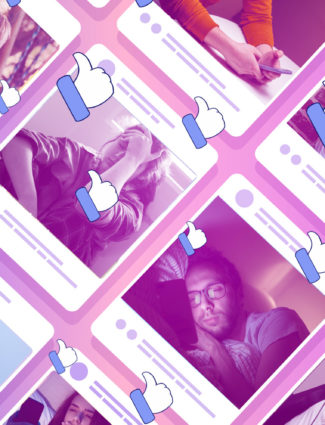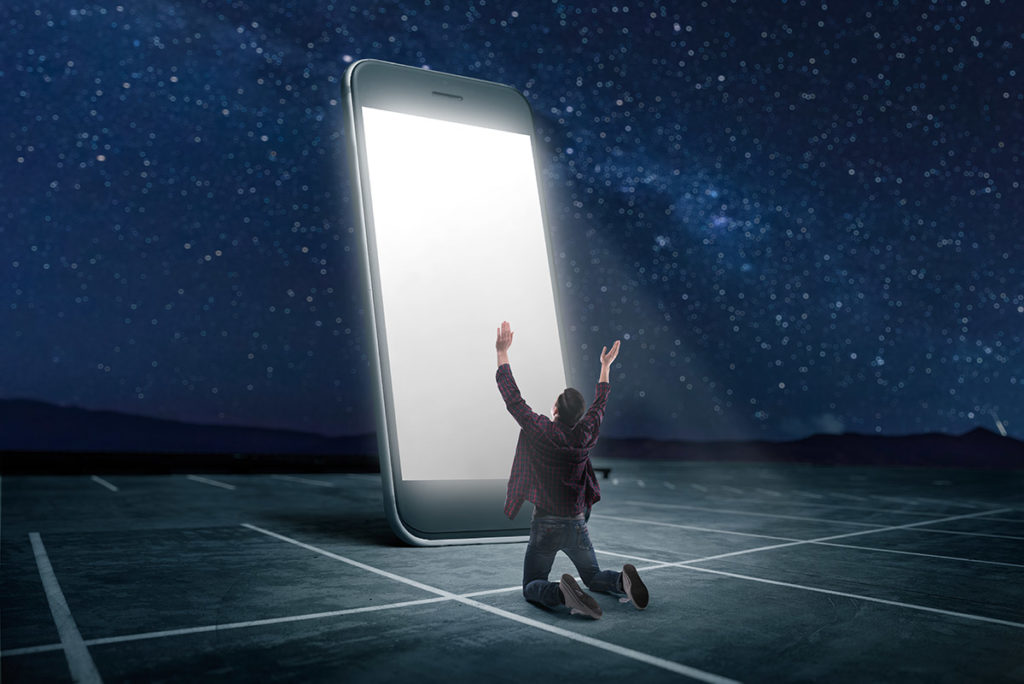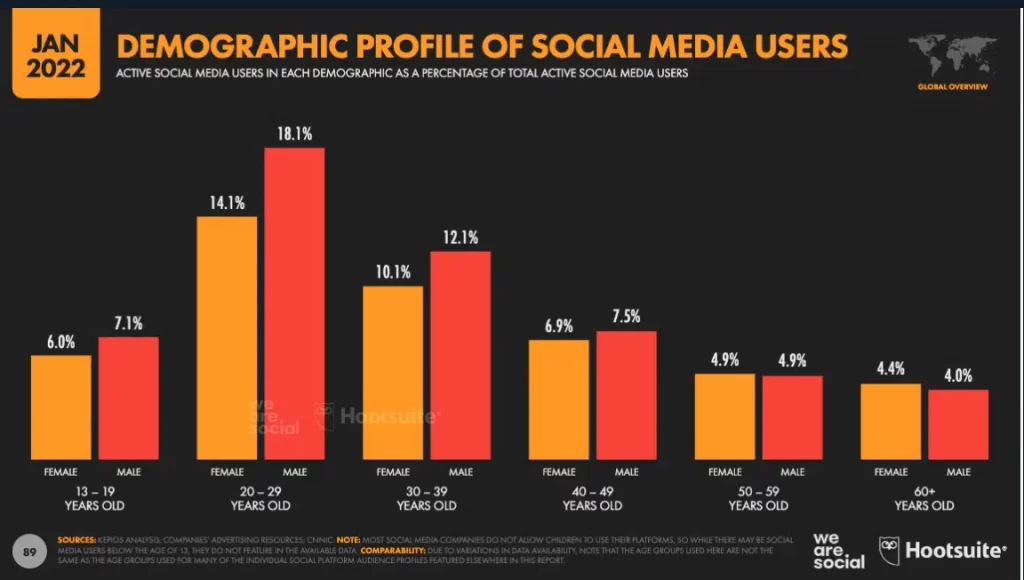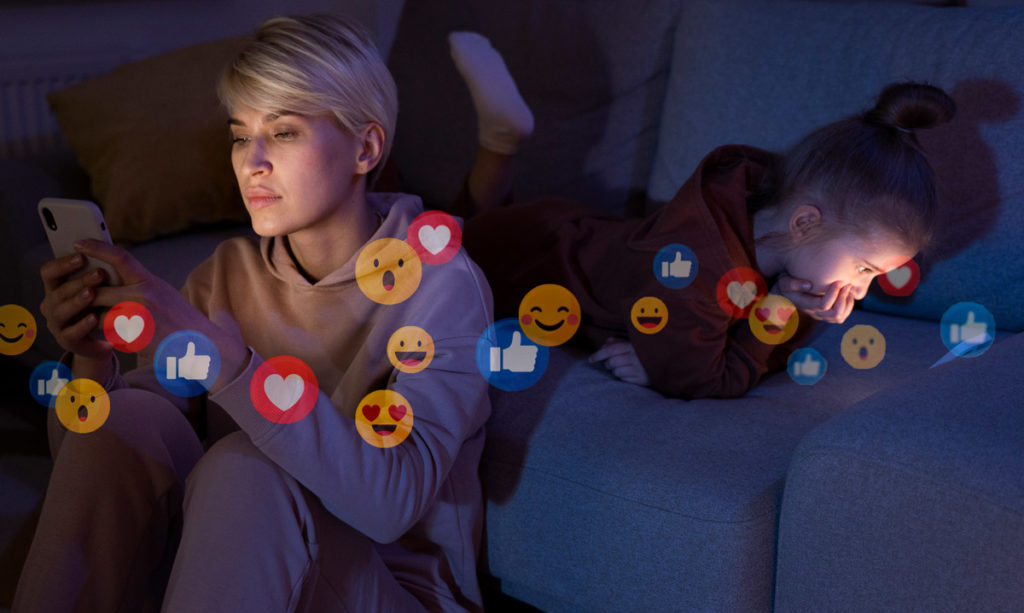Social Media Addiction – Statistics, Symptoms, Treatment

Millions of people around the world use social media every day but how does a seemingly harmless hobby become an addiction?
An ever-increasing array of social networking sites are available on which to post, like, comment, share or follow – from Twitter, Facebook and Instagram to Snapchat, TikTok and YouTube.
While social media is a great way to connect with friends and family, watch videos and discover a world of information, for many people it can have negative repercussions including a fear of missing out (FOMO). This can make some people feel that others are leading more fun and interesting lives, which can trigger feelings of loneliness and low self-esteem that can eventually cause more serious mental health issues.
This article lifts the lid on social media addiction – what it is, how to identify it and where to get support if you, or a loved one, are struggling.
Get immediate help for you or a loved one’s social media addiction. Book a free Gameplan call now to learn if our program is the right fit for you.
What is social media addiction?

There is currently no official diagnosis of social media addiction. The Diagnostic and Statistical Manual of Mental Disorders (DSM) from the American Psychiatric Association lists it as a “condition for further study”. However, compulsive social media use is widely recognized as a behavioral addiction that is becoming increasingly common and gaming disorder was officially recognized in 2019.
Unlike addiction to drugs, alcohol and nicotine, behavioral addictions do not involve a substance. However, the desire to experience a ‘high’ from the behavior – in this case scrolling through posts, images and videos – can be just as strong, especially if the app is particularly dangerous.
Social media addiction is usually characterized by an uncontrollable urge to log onto social media and continue to engage in the activity for extended and frequent periods of time despite the damage it may cause to relationships, work or school responsibilities, and physical and mental health.
Clearly not everyone who uses social media will develop an addiction. But as social networking sites becomes increasingly accessible to more and more people around the world, there is likely to be an associated rise in the number of people suffering from social media addiction.
Why is social media so addictive?
In order to understand why social networking sites can be so addictive, we need to look at how social media affects the brain.
Whenever you use social media, the brain releases dopamine – the feel-good neurotransmitter. As a result, the dopamine makes your brain recognize social media as a rewarding activity that you should repeat again and again. Over time, the brain becomes reliant on this type of stimulation as the positive feelings experienced when using social media are only temporary and the dopamine rush soon wears off. So, the brain needs more and more social media use to induce the same feelings of pleasure – there’s even a term now called TikTok brain.
The constant stream of likes, comments, shares, views and emoticon reactions from social networking sites cause the brain’s reward pathways to trigger the same kind of chemical reaction seen with alcohol or drug use. Stanford psychiatrist, Anna Lembke, describes the link between drugs and ‘digital dopamine’ when describing the addictive potential of social media:
“Just as the hypodermic needle is the delivery mechanism for drugs like heroin, the smartphone is the modern-day hypodermic needle, delivering digital dopamine for a wired generation. The hypodermic needle delivers a drug right into our vascular system, which in turn delivers it right to the brain, making the drug more potent. The same is true for the smartphone; with its bright colors, flashing lights and engaging alerts, it delivers images to our visual cortex that are tough to resist. And the quantity is endless. TikTok never runs out.”
Sometimes, social media is used to relieve stress, loneliness or depression. However, the more you turn to social networking sites as escapism, the more the negative consequences of social media will worsen loneliness or stress. This pattern of behavior can become increasingly destructive over time. Undoing the damage done to the brain because of addiction to social media can take months to correct.
Social media statistics: scale and usage

Source: Hootsuite’s Digital Trends Report 2022
These statistics offer a fascinating insight into the scale of social media usage and how overreliance on social networking sites can be a cause for concern.
- 4.62 billion people now use social media – 58.4% of the world’s population. Globally, the number of social media users has grown by more than 10% (424 million) in the last year.
- It is projected that the average adult will spend 6 years and 8 months of their life on social media.
- The average daily time spent using social media in 2021 was 2 hours 27 minutes (up from 1 hour 37 minutes in 2013).
- More than 210 million people worldwide are estimated to have suffered from addiction to social media and the internet in 2017. Allowing for increase in social media usage since then, it is estimated that around 333 million people globally are likely to experience problematic social media use today. In fact, some experts think that up to 10% of people in the US could have social media addiction.
- 9% of US online users report feeling “completely” addicted to social media, with 30% feeling “somewhat” addicted. The percentage of people addicted to social media is highest among those aged 23-38 with 15% feeling “completely” addicted and 37% feeling “somewhat” addicted.
- Young people who spend five hours each day using their phones are almost twice as likely to have depression than people who spend only one hour a day online.
- Young, single females are more likely to be addicted to social media than any other group.
- Almost half of teenagers (45%) check mobile devices after going to bed and around a quarter (23%) check their mobile device more than 10 times a night.
- FOMO (fear of missing out) is experienced by 56% of social media users who are afraid of missing out on events, news and important status updates. The most common contributors of FOMO include Facebook (72%), Instagram (14%), Twitter (11%), and Pinterest (8%).
- Young people feel under pressure to portray their ‘best life’ on social media and are concerned about how others will react to their posts: 32% worry about the number of likes they receive on a post, 40% often compare themselves to others on social media and 36% are concerned about receiving hurtful or negative comments.
- Discord has 250 million registered users as it has become the social playground and fabric for most are teenagers.
Warning signs of social media addiction

For most people, social media is a fun activity but for others it can become an unhealthy obsession. How do you know when your social media use – or the behavior of someone you care about – has become problematic? Here are some common warning signs that your relationship with social media may be spiraling out of control:
- Frequently thinking about social media and planning how and when to use it next.
- Needing to spend more and more time on social networking sites to find the same level of pleasure.
- Attempting to control, cut down or stop spending time on social media, without success.
- Feeling irritable, restless or anxious when unable to use social media.
- Experiencing unpleasant physical and emotional symptoms when social media use is restricted or stopped.
- Using social media to forget about or cope with personal problems.
- Engaging with social media so much that it has a negative impact on work or school.
- Unable to stop scrolling through social media during other activities such as eating out with friends, watching a movie at the cinema or even while driving.
- Losing interest in all other hobbies and pastimes.
- Quickly reverting to excessive use of social media after a period of abstinence.
Get immediate help for you or a loved one’s social media addiction. Book a free Gameplan call now to learn if our program is the right fit for you.
The link between social media and mental health issues
Does time spent on social media always have negative mental health implications or can it be beneficial for our well-being?
According to a review of studies, excessive social media use is associated with a number of psychological problems, including anxiety, depression, loneliness, attention deficit hyperactivity disorder and addiction for a minority of people. This is because the overconsumption of social media can make them feel isolated and socially excluded if they think that their life is not as exciting or fulfilling as other peoples’. Another study shows that young people who spend more than two hours a day on social networking sites are more likely to have poor mental health with high levels of psychological distress and suicidal ideation. This can be especially true for people on apps like Discord, TikTok and Reddit.
However, other research suggests that social media use is not always harmful. A large-scale study published in the journal Psychological Science found that the relationship between screen time and mental well-being works in a concept known as the ‘Goldilocks hypothesis’. This concept uses the same analogy as the Goldilocks and the Three Bears fairy tale – where moderation in screen time rather than porridge (not too hot, not too cold) and beds (not too hard, not too soft) is ‘just right’. The research found that high levels of daily screen time (2+ hours), especially on weekdays, was linked to lower levels of well-being. However, it also found that very low (or no) daily screen time was also linked to lower levels of well-being. The optimum well-being was associated with just under an hour a day spent online.
How to achieve a healthier balance with social media

If you, or a loved one, want to reduce the amount of time you spend mindlessly scrolling and posting on social networking sites here are some tips:
- Education is key. Just as parents talk to their kids about stranger danger, safe sex and avoiding drugs, you should be discussing social media usage too. It’s not just about the negative impacts of excessive use, it’s also teaching them about cyberbullying, sexting, appropriate emojis, and sharing personal photos on social media sites. You might even need to learn common TikTok terms and phrases.
- Delete all social media apps from your smartphone so you won’t be tempted to open up the endless flow of information and feedback. Restricting access to your desktop or laptop may help you be more intentional in your use and reduce the amount of time you spend on social media overall.
- If you aren’t prepared to delete all social media apps immediately, at least reduce your screen time by turning off or use ‘do not disturb’ on your smartphone at school or work, during mealtimes, when spending time with friends and family, and definitely while driving.
- Switch off notifications on your social media apps some or all of the time so it doesn’t become a constant distraction.
- If you aren’t ready for complete abstinence from social media, allow yourself a certain amount of time on social media sites each day. Our screen time guidelines for children, teens and adults will help you decide on a reasonable limit. You may find it helps to set a timer so that you stay on track.
- Leave your smartphone, tablet and computer out of your bedroom. If you currently use one of them to wake you up in the morning, buy an alarm clock.
- Find replacement hobbies or activities that are not technology related. Our hobby tool has over 70 ideas to inspire you.
- Arrange to see your friends and family in person, rather than on a screen, whenever possible.
- Try to have regular breaks from social media to stay in control and reduce your dependency on it. Take small steps to start with – perhaps an hour or a half day – then build up to a full day, weekend or avoid checking it when you’re on vacation for a complete digital detox.
Get expert help
Reducing screen time can be an effective way of cutting down on social media use before it becomes harmful. However, if your addiction to social networking sites is deep rooted, you may need professional support.
Social media addiction is treatable and many people have successfully recovered. Our coaching program is designed to help individuals and families establish a healthier relationship with technology.
Get in touch to book your gameplan strategy call to discuss how to stop social media addiction and regain control of your life.
